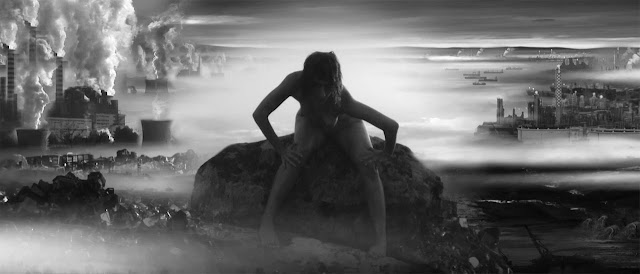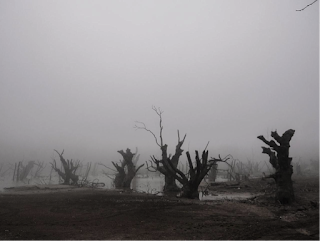Shooting Irma Down (Or not?)
Is nature a primeval, unattainable,
vengeful entity, distinct and separate from all human presence and activities?
Are humans another part of nature? Shaping
it as it shapes us, living within it, from it, for it.
An important and recurring theme in debates
about development, conservation
and nature in general begins with how we define
nature and what the term ‘natural’ really means. I could expand on these
notions, their implications, histories and consequences, but instead I will
only present you with two videos, which I find to be representative of each of
the two aforementioned perspectives on what Nature really is.
In this visual and cognitive juxtaposition
you see in the first video an organised attempt by Floridians to ‘shoot at
Hurricane Irma’ to deter or stop it:
The second video is a trailer for the movie
‘Baraka’. A stunning array of visuals alternating between human-dominated
landscapes, pristine natural ecosystems and humans positioned within ‘Nature’:
Popular culture and media are
quintessential in shaping cultural narratives and the way we view the world. When
does nature begin, where does it end, is there a buffer zone in between and
where do we stand in all of this? Maybe nature and society are not fixed. Their
intricate relationships blur their potential borders.
In the words of Irus
Braverman: ‘‘Relational
geography understands identities such as ‘nature’ and ‘society’, or ‘the urban’
and ‘the rural’ as fluid, complex, and emergent from situated interactions and
interconnections, rather than as fixed as immutable essences’’.
So, what is Nature to you?
Photo credits: Tassos Vrettos




Such beautiful prose Chris, I really enjoy the way you write. I feel as though recent trends in popular culture and media are guiding us to becoming more aligned with 'nature' and the 'natural'. Am I not right in saying "it's cool to be vegan now"?
ReplyDeleteThank you! Yea you are right. However, anything that becomes mainstream as a notion, I would take with a pinch of salt. I think that someone who becomes vegan (or replace the word vegan with anything for that matter) just for the sake of being cool, does not have even half the impact of someone who takes an actual stand. But yea, I will agree with you overall that I am optimistic about people's changing perceptions towards nature and the environment
DeleteYes I totally agree - a heavy handed pinch of sustainably sourced sea salt (NOT pink Himalayan salt for crying out loud!) is needed for any mainstream trends as generally they are transitory and not as impactful, as you have rightfully pointed out. However, perhaps through veganism becoming more mainstream a certain percentage of people who may not previously have considered it now go, oh hang on a second - what's all this about? And low and behold they enter along the path of environmental campaigner/academic/lawyer or similar... I'm sure you catch my drift. Also isn't an increased number of people simply living more sustainably (if that what veganism truly is, which is a whole other debate) a good thing regardless of their motives?
DeleteYea definitely agree with all that you say - There are a lot of considerations in some aspects of vegan sustainability (as you and i both know), but yea, i guess we both agree that the best way forward is a critical evaluation of every option available.
DeleteP.S. the pink salt reference killed me.
I love how you've featured Baraka here. I remember being struck by how slowly, yet cinematically grandiose the film begins as it spans across seemingly "wild" geological landforms, before speeding up to show all the transitory, crowded lives of lots human beings. It really gives a sense of how insignificant we are on a geological scale. And yet, the film merges these "natural" scenes with it's "social" scenes in such a smooth manner that you still get a sense of our embeddedness in Earth systems. An interesting alternative perspective on the "Anthropocene" !
ReplyDeleteExactly, I really like the alternation between the different landscapes and the difference in the degree of 'human influence'. It's what you said basically: we can completely 'alter nature', but we are still inextricably a part of it
Delete